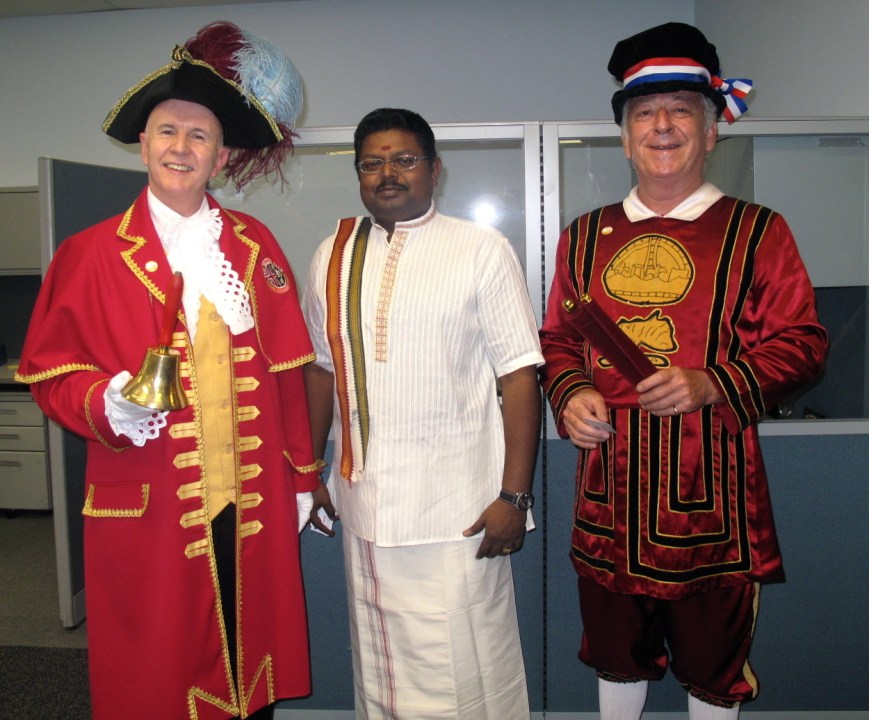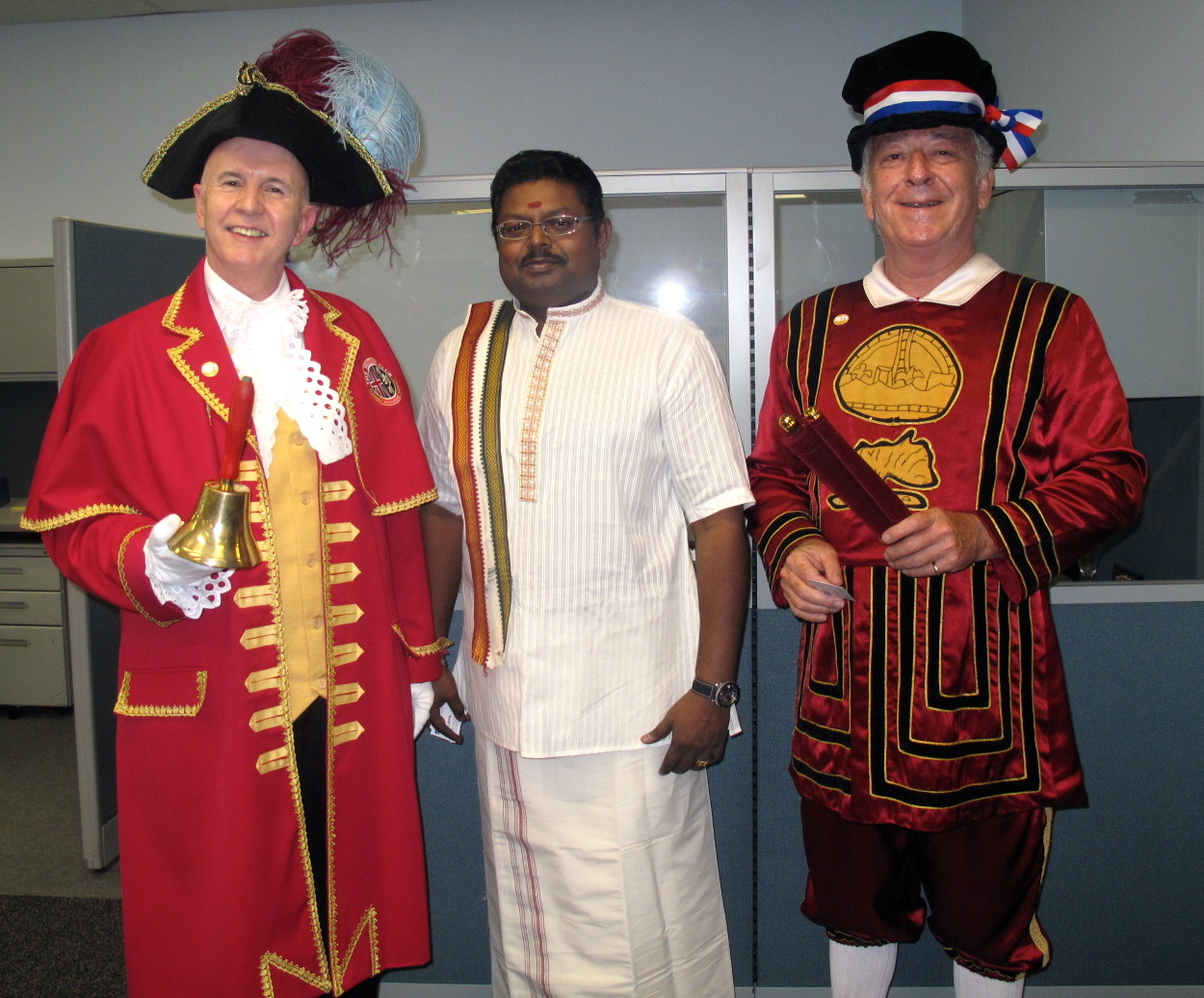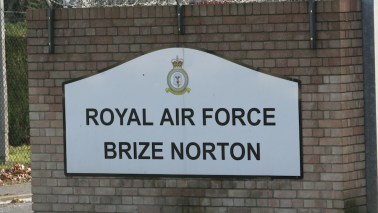 Last month, dressed as a town crier, the head of the British Club in Singapore, Sean Boyle, visited the offices of every major newspaper in the country. Accompanied by an entourage
also in fancy dress, he declaimed that the British Club would be celebrating the nuptials of Prince William and Kate Middleton in a festival that would last 10 days.
Last month, dressed as a town crier, the head of the British Club in Singapore, Sean Boyle, visited the offices of every major newspaper in the country. Accompanied by an entourage
also in fancy dress, he declaimed that the British Club would be celebrating the nuptials of Prince William and Kate Middleton in a festival that would last 10 days.
The reception to his announcement was warm. An editor of the Tamil Murasu, the newspaper that serves Singapore’s ethnic Indian population, left the newsroom to return dressed in traditional Indian costume, to pose for photos with Boyle (see above). The team at the Berita Harian, the Malay-language daily, gave the entourage a standing ovation.
As a publicity stunt, the British Club — a members-only institution whose 10-day jamboree actually marks the first time it’s opening events to the public — couldn’t have done better. News of its festivities has been featured in all the main newspapers, and Boyle also appeared on regional TV network Channel News Asia, again in town crier gear.
“Our phone has been ringing off the hook,” says Boyle, who is general manager. (Coffee House meets him on an evening when he’s dressed as the Pearly King, ahead of a special Royal Wedding pub sing-along called Roll Out the Barrel, Roll Back the Years.) “It’s generated lots of interest. We’re getting the right exposure.”
At 10 days, nine days longer than the celebration in Britain, the Club’s festivities may well be the longest in the world. To a non-Briton like me, the list of events seems a strange mixture of the grandiose and the bucolic. There’s the pub sing-along, and a British-themed pub quiz, and a street party at the Club’s Verandah Terrace. There’s a Ladies’ Champagne High Tea and a Ladies’ Ascot Night.
Everything culminates on Friday, of course, with 300 people expected for a night of revelry as they watch a live telecast of the Wedding on a big screen. There’ll be a £100-per-head four-course dinner, where the BBC has apparently booked three tables for corporate guests. Ladies are advised to wear hats.
Is it normal for the British to wear hats at night, I ask. “It’s a wedding breakfast,” says Boyle. “We’re linking up via broadcast to Westminster Abbey. It’s a private soirée, a grand affair.”
The 25-year-old British Club (other much older, Brit-centric clubs in Singapore are the Tanglin Club and the Cricket Club) was formally opened by Princess Anne. It has a membership of 2,400, but because a family is considered as a single membership, the Club probably caters for three times that number in individuals. A little more than half of members are British expatriates, 20 per cent are Singaporean, and the rest hail from other countries. An individual membership costs about £6,300, with monthly fees of £65. Members get access to a spa, a six-lane pool, a reading room and library, a video arcade room, a jackpot room, a pub (the Windsor Arms) and restaurants.
Clearly, not all the tens of thousands of British expats in Singapore will celebrate this way. In fact, as the Royal Wedding lies between the public holidays of Easter and Labour Day, many of them won’t be in town, but golfing in Phuket, bringing their families to the Malaysian Club Med or trekking in the Himalayas.
“I don’t know a single of my British expat friends who’s joined the British Club,” says one. “And I don’t know any who are going to watch the Royal Wedding on television. My own Fridays are spent catching up on Midsomer Murders.”
Still, even the more cynical among the expats aren’t derisive about the Royal Wedding. It’s as though, faced with the prospect of their words actually being published, they find they can’t bring themselves to criticize the monarchy.
“I think most Brit expats won’t be doing much, but may join the parties such as the Brit Club for a bit of nostalgia,” says an ex-Londoner with a Japanese fiancée. “Nostalgia for something they never would have done, if they were actually back home.”
For Singaporeans, the Royal Wedding has been greeted with much interest and goodwill, if not exactly frenzied excitement. This tiny city-state, at once town and country, is preoccupied with affairs of its own.
An ex-British colony where many streets still bear the names ‘Stamford’ or ‘Raffles’, it’s now in the midst of campaigning for general elections. Opposition parties will be contesting the most parliamentary seats since independence in 1965, but the People’s Action Party, the only ruling party Singapore has ever known, is widely expected to win.
P.S. Here are a couple of photographs of one of the celebrations:









Comments